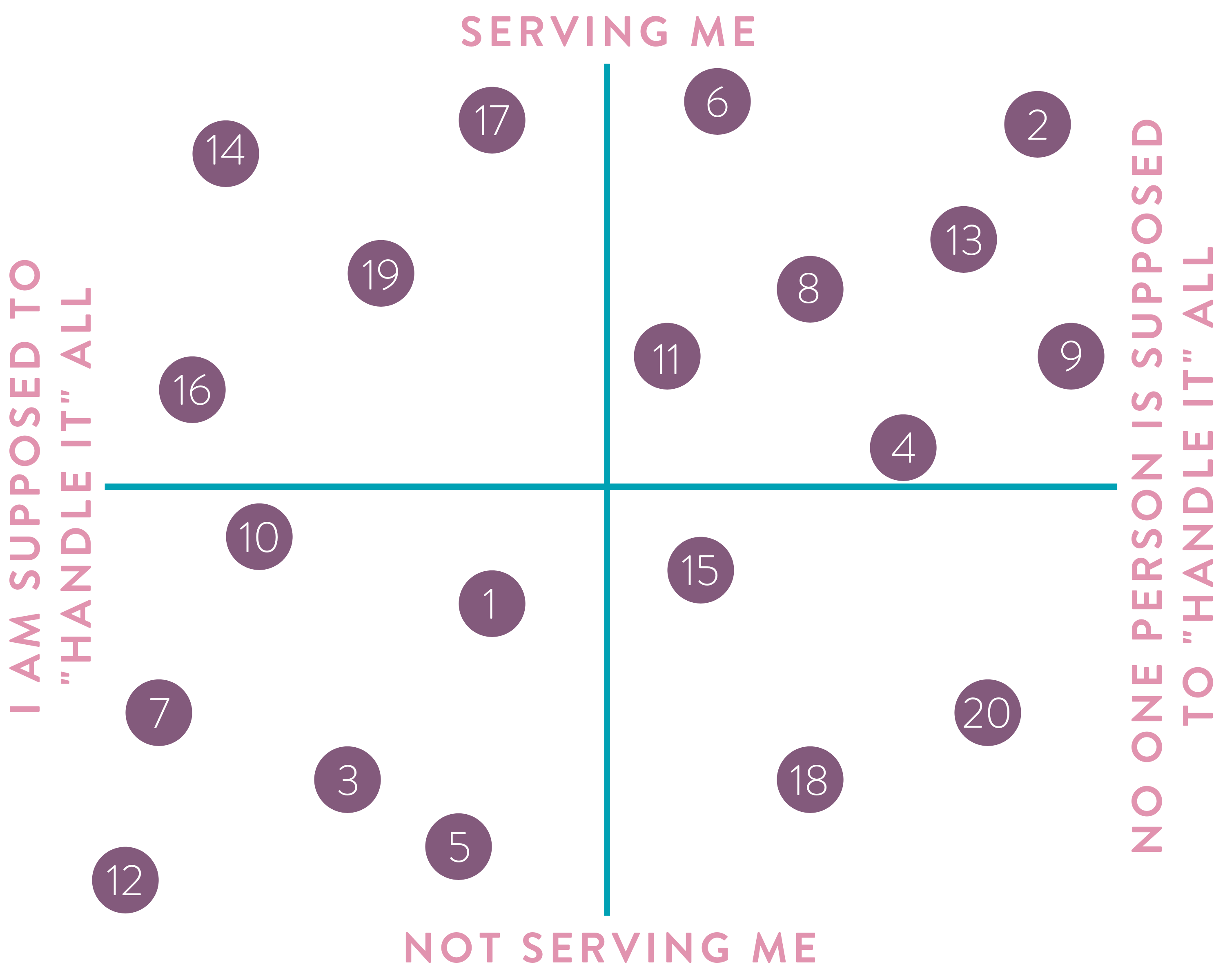Moms Unscripted!
An exploration of how to transform your experience of motherhood
Part 3
Written by Shannon Sweeting-Woods, MSW, RSW
Welcome to Part 3 of our exploration of scripts in motherhood. By now I imagine you have had a chance to notice several different scripts that guide your experience of motherhood. We will continue unpacking the example:
I am a mom so I am supposed to be able to handle it!
Last time we got curious about where such a script comes from. After building awareness of what the script is based upon, we can next ask ourselves:
Who or what benefits from this script?
This is a loaded question. As you may have gathered by now, the answer will likely sound a little different for each of us. I invite you to take your exploration as deep as you feel compelled to. As before, we can examine the micro-level and the macro-level.
Within your partnership or co-parenting relationship, you might notice that this script offers benefits to the other parent if they also subscribe to this script. For example, if one parent is always handling it there is less need for the other to step in. It does not take long for a pattern to solidify whereby the household and emotional labour distribution is grossly out of balance. In heterosexual relationships, this dynamic tends to uphold values associated with patriarchy. The belief that a mother must handle it all might just form a strong pillar for patriarchy to rest upon.
What other systems and structures can you think of that benefit from this script being upheld?
How about Capitalism? Is this system not maintained when mothers believe they must handle it? Consider examining, for example, how some corporations take this script, reinforce the narrative through their own marketing, and use it for their own gain.
Depending on your view, you might also consider that nobody in the family system or society at large actually benefits from this script. Many partners appear to benefit from less parenting/household demand but are actually longing to contribute in a way that offers meaning and purpose to their role. Sometimes when we believe we must handle it all, other caregivers receive an implicit message about their role and/or level of competence, which can limit their ability to step into their preferred identity as well. Whereas, women-identified parents continue to experience getting cast into a leading role with a rigid set of expectations, as a result of their choice (or absence of choice) to become a mother.

Having planted seeds of consideration about who/what benefits outside of your unique self, we now get to the heart of the matter:
How is the script serving and/or not serving you?
I suspect that no one has an either-or response; you will likely be able to name ways this script works for you and ways it does not. This question is worthy of a thorough personal examination because in order to make a change, we need to acknowledge what we might be giving up in addition to what we might be gaining. There are two sides to every stage—and all that is in between—so for every way this script does not serve you there is likely a related way that it does.
For example, if you feel that you successfully handle it all as a mother, you may say that you actually benefit. You may get a sense of pride and accomplishment at your innate skill for parenthood. You may appreciate the perception of control you have over outcomes in your household. You may experience a great sense of fulfillment and satisfaction from being a mother.
You may also experience high levels of stress, exhaustion, burnout, relationship difficulties, etc.
Or not.
The point is, it can be both A and B. Both serving you and not. Both rewarding and debilitating.
It might even be both at the exact same time. Consider again if you feel like you are handling it all. The fact that I feel good when I am handling it all might not actually serve me. It might reinforce the very notion that my self-worth is contingent on what I do or don’t do. That is to say: If I feel good because I am successfully handling it all, what happens the moment I am unsuccessful? How am I to feel then?
The matrix below might support your exploration as you plot thoughts, beliefs, feelings, and experiences along the spectrum of subscribing to the script and discarding the script altogether. Once we have explored where we land, we next ask ourselves:
- Do I perceive or believe there would be a cost to rewriting or discarding this script?
- What would rewriting or discarding this script offer myself and others?

1. Less time for other activities I value
2. More choice over how I spend time with my children/family
3. Sense of exasperation and/or disempowerment
4. Sense of energy and empowerment
5. Decreased self-worth (when I perceive I am not successful at “handling”)
6. Increased ability to experience multiple/preferred identities
7. Relationship and/or co-parenting battles
8. Opportunity for children to develop multiple secure attachment relationships
9. Opportunity for other caregivers to develop preferred relationships with children
10. Increased stress and/or exhaustion and/or burnout
11. Reduced stress and/or exhaustion and/or burnout (when adequate support in place)
12. Reinforcement that self-worth is tied to what I do or don’t do
13. Sense of inherent self-worth
14. Sense of accomplishment
15. Discomfort, tension and/or conflict in co-parenting relationship if not well supported
16. Sense of pride
17. Discovery of newfound skills/abilities under pressure to “handle it”
18. Possible self-doubt and/or discomfort in the face of the script living on for others
19. “Handling it” can motivate me to continue “handling it”
20. Possible judgment or perceived judgment from others (and associated social costs)
Join me for Part 4 as we work through these questions and move closer to writing our own scripts for motherhood.
Please join us if you haven’t had a chance to read Part 1 and Part 2.
We are here to help you start the conversation.
To connect with one of our counsellors, call 613-701-7574 or email us at info@ksrc.ca

